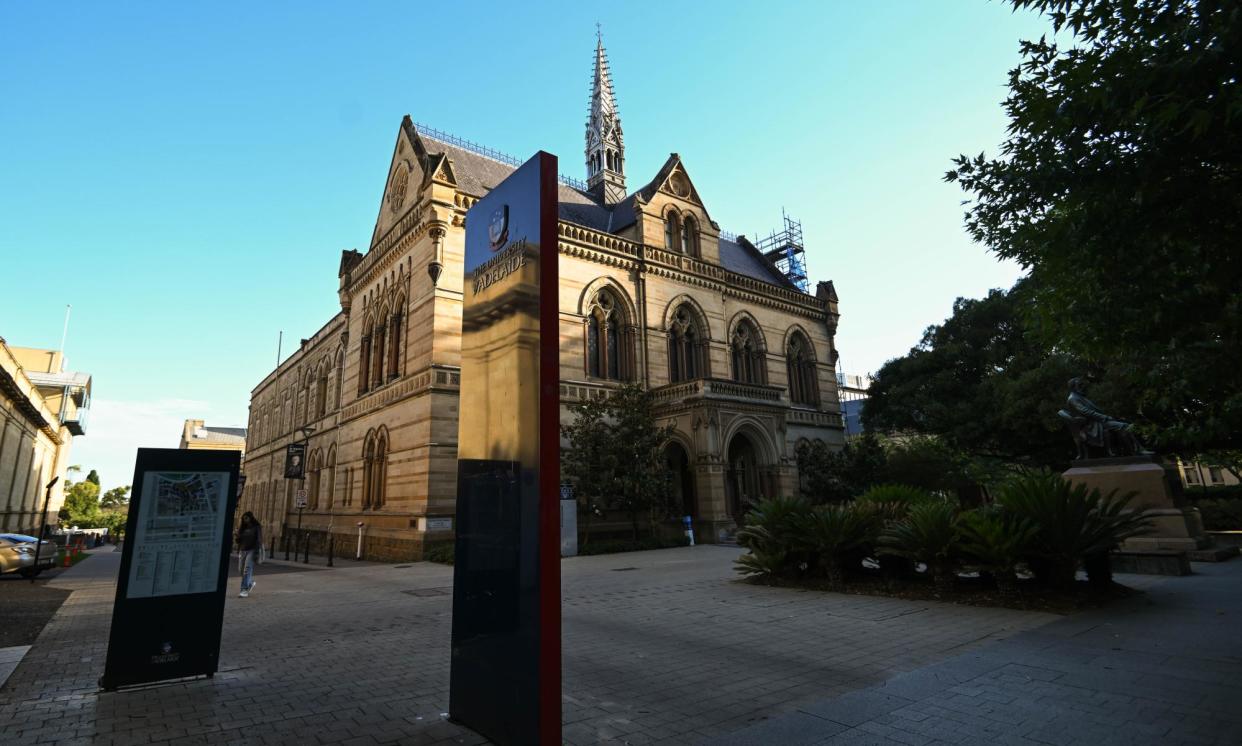‘The death of campus life’: first major Australian university dumps face-to-face lectures, leaving staff ‘furious’

The newly amalgamated Adelaide University has become the first Group of Eight institution in Australia to ditch face-to-face lectures, in a move condemned as accelerating the “death of campus life” by the union representing tertiary education staff.
Ahead of the merged university opening at the beginning of 2026, staff at the University of Adelaide and the University of South Australia were informed last week that traditional lectures would no longer form a part of courses.
In a document to staff, seen by Guardian Australia, the new university wrote “most students” would no longer attend face-to-face lectures, which from 2026 would gradually be replaced by “rich digital learning activities”.
Related: Revealed: 15 Australian universities to have their international student cap slashed
“These activities will deliver an equivalent learning volume to traditional lectures and will form a common baseline for digital learning across courses, providing a consistent experience for students,” the university wrote.
“These asynchronous activities will be self-paced and self-directed, utilising high-quality digital resources that students can engage with anytime and anywhere.”
Dr Andrew Miller, division secretary of the National Tertiary Education Union’s (Nteu’s) South Australia branch, said members had “enormous concerns” about the move, describing staff as “furious”.
“We were promised the new university would be co-created with staff, students and community stakeholders,” he said. “This decision sidestepped that commitment. Co-creation means giving agency and empowerment to collectively build the university.
“This happened on the basis of consultation with limited cohorts of people.”
Adelaide University’s publicly available FAQ page does not list lectures as a class type students will experience during their studies, while noting there will be “online and in-person options” for workshops, tutorials and other classroom settings.
Miller said it should be up to academics to decide the best learning outcomes for their students.
“This flies in the face of co-creation and professional autonomy and expertise,” he said.
Related: Australian universities accused of awarding degrees to students with no grasp of ‘basic’ English
“Flexibility [between online and face-to-face] ordinarily works both ways – some learners benefit tremendously from face-to-face learning with a specialist academic present while there are other independent learners that benefit from more remote digital engagement.
“We are demanding they reverse the decision and go back to co-creating.”
Prof Joanne Cys, domain lead for curriculum at the new Adelaide University, said staff had been “comprehensively engaged” in creating the new curriculum. More than 4,000 had been engaged in the process, she said, while 900 had been in direct consultation.
“This collaboration is ongoing … with more than 1,500 staff set to develop the content for Adelaide University’s courses and programs between now and 2026,” she said.
Cys said digital learning activities would not be the “dominant learning mode” but noted the university had seen a “steady decline” in attendance on campus.
“These digital activities will support flexibility and accessibility, and provide more engaging teaching methods that are better suited to contemporary students.”
Australian universities have increasingly shifted learning activities and assessments online since students were forced away from campuses during the pandemic, with research pointing to time and workload pressures, cost cutting and continued post-Covid challenges.
But it hasn’t been without its critics. In 2021, Curtin University faced a major backlash from students after proposing to phase out all face-to-face lectures and replace them with three 15-minute videos a week.
Related: Australia’s $50,000 arts degree is here – putting university fees on par with the UK and US
In response to feedback, a compromise was reached for the Western Australian university to provide “face-to-face learning opportunities” with “online learning when desired”.
The national president of the Nteu, Dr Alison Barnes, said it struck her as “outrageous” to remove the face-to-face lecture component from courses.
“Having lectured most of my adult life ... I think about how many students have approached me before or after lectures to raise academic issues, things they haven’t understood about material or want extra help with.
“You’re the face there,” she said. “You can give them assessment or get them what support they might need. This is an undermining of both academic integrity and pedagogy and pastoral care.”
Barnes said the shift to online learning also exacerbated the “death of campus life”, which was having knock-on effects to the student experience.
“What is a ‘rich digital learning activity’?” she asked. “Removing [the] human in teaching? It completely flies in face of the nature of academic work, the very fabric of the institution.”


